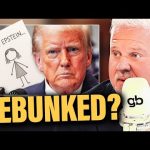A rumor floating through the media echo chamber claims that former President Donald Trump, famous for his bombastic style and business bravado, supposedly dabbled in art and poetry—crafting a portrait and penning an introspective poem for none other than Jeffrey Epstein. It’s a story so bizarre that, in any other context, it would make for decent satire. Yet, somehow, some corners of the press have chosen to run with it in earnest, even when the so-called facts amount to little more than hearsay.
Despite the headlines, there’s no credible evidence that Trump ever painted Epstein’s portrait or wrote a poetic treatise on yearning and existential struggle. Even the Wall Street Journal, the outlet credited with publicizing the rumor, admits it hasn’t seen the original documents or any hard proof. That’s journalism 101: verify before you amplify—especially when it involves two of the century’s most notorious figures. Yet this hasn’t stopped other media from batting the story around as if it were an undeniable fact.
It’s worth remembering that Donald Trump built his career and his presidency on outspokenness and transparency—never one to hide his opinions behind flowery prose. His communication has always been straight-shooting, sometimes to a fault. The leap from all-caps tweets and campaign rally chants to mysterious, soul-searching poetry simply doesn’t fit the man most Americans recognize from decades in the public eye. The narrative sounds like a late-night comedy sketch or a political fever dream—not presidential history.
So why does this type of sensationalist gossip persist? It’s the predictable outcome of media distaste for Trump—an appetite for any story, no matter how thin, that casts him as a sideshow. We’ve seen the press jump the gun with Russia hoaxes, selective leak coverage, and unfounded “bombshells.” This latest installment is just another example of the left-leaning media clutching at straws, hoping to score points with innuendo rather than fact.
Until actual evidence is presented—something more substantial than anonymous “sources” or a game of journalistic telephone—this wild tale belongs in the fiction aisle. Conservatives, and indeed all Americans, should remain skeptical of media narratives designed more to titillate than to inform. The press owes the public honesty, not clickbait. Until then, the notion of Trump as the tragic poet in Epstein’s orbit can be safely chalked up to political fantasy, not reality.




